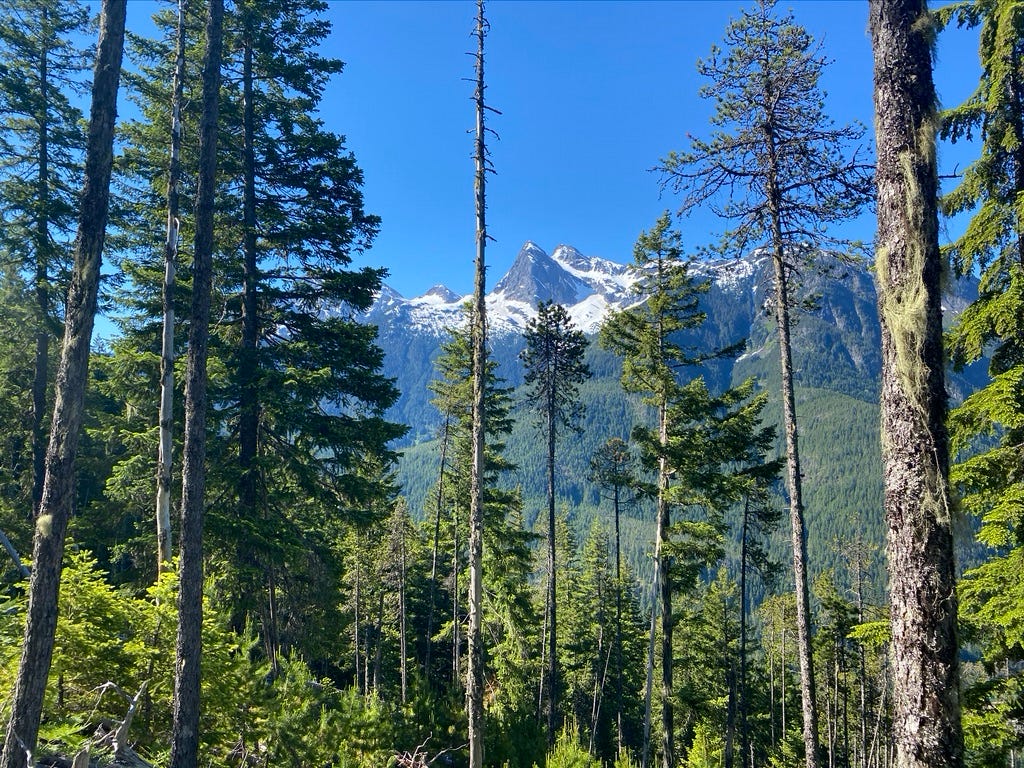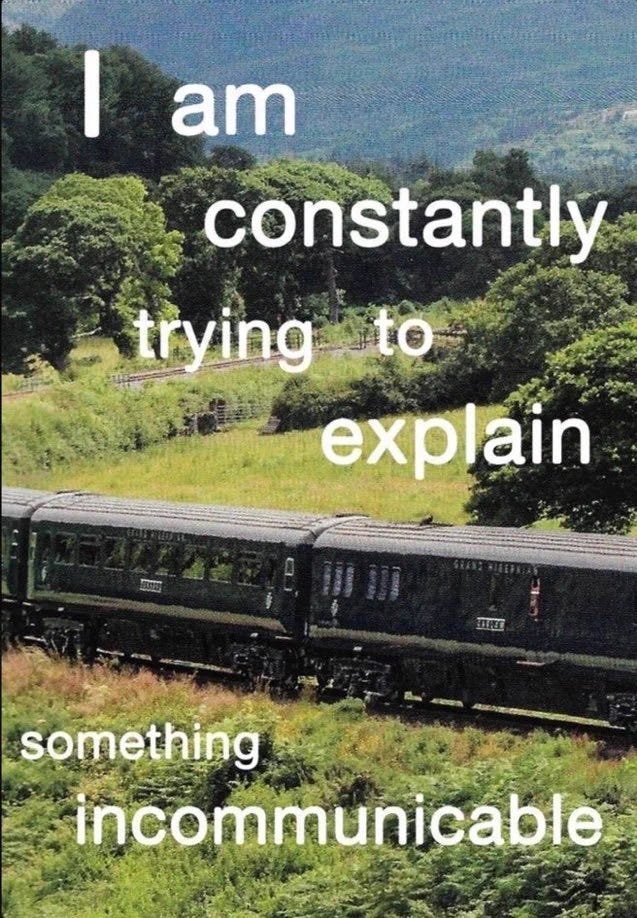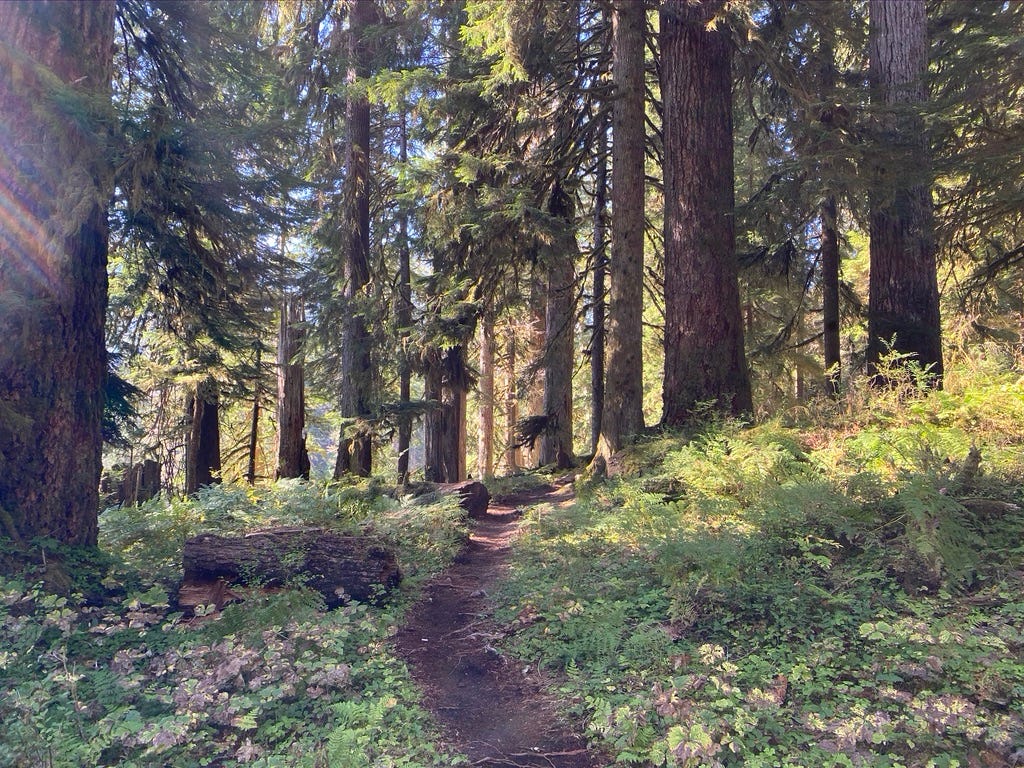It Is Not Man But The Universe That Is Subtle
Some thoughts on the ineffable, before I sign off for a while.
Things don’t have purposes, as if the universe were a machine, where every part has a useful function. What’s the function of a galaxy? I don’t know that our life has a purpose and I don’t see that it matters. What does matter is that we’re a part. Like a thread in a cloth or a grass-blade in a field. It is and we are. What we do is like wind blowing on the grass.
- The Lathe of Heaven, Ursula K. Le GuinThis will likely be my last newsletter for a little while,1 which makes this feel like a good time to try to describe something I’ve been working toward and picking at here for years.
What I have come to understand, through writing in this space and reading in others, is what I believe god to be, and not to be. Always uncomfortable to talk about, especially if you don’t mean god in the Abrahamic sense, especially if you’re worried about sounding like the back of a Dr. Bronner’s bottle. Especially if like me you’re terrified of being misunderstood, or maybe more accurately terrified of making a point badly, or, sloppily, or incorrectly. But here we are.
I guess what I believe in more than anything is the holy spirit. Or a holy spirit, lower case. It is no accident that Spirit means breath. That which is holy and sacred is not some other thing apart from us, but is made through us: the breath of the living. We breathe god into being— god, in my understanding, being the connecting force that unites all the matter of the universe into something higher and more important than the simple sum of its parts.
This belief of mine exists outside the idea of a Creator that snapped the cosmos into being from nothingness. Really what I believe in is the opposite order of events from that story. That the existence of life, of sentience, of interaction, brought with it into the world that which is holy. It brought with it the possibility of connection, of community, of endless intertwining pathways that make all living things inextricable from all others. That’s all that matters to me, in the end. That we’re a part. That there is not the natural world and the human world, adjacent but separate, as we’ve convinced ourselves. There is simply the world, which is nothing but everything it contains. Everything is everything, like the Fugees said.
There’s a lot of power in that idea, I think. That we created god, not just in the sense of codifying religious beliefs but in the literal sense. That our existence, paired with the existence of everything else, brought god into being. To acknowledge this is to acknowledge the need to reexamine the way that we live now, to reintegrate ourselves into the animate world we were always meant to be a part of.
Because right now we don’t believe in living so much as we do not dying. This is vanity, and a denial of the essential dignity that is, or should be, available to each of us. Because we are robbed of living well, which is to say in harmony with these forces I’m talking about, we are robbed of dying well, too. (“American individualism, much celebrated and cherished,” writes Wallace Stegner in Where the Bluebird Sings to the Lemonade Springs, “has developed without its essential corrective, which is belonging.”)
It doesn’t have to be this way. Barry Lopez writes, in Of Wolves and Men, of the seeming peculiarity of the dance between wolves and their prey. Wolves have been observed locking eyes with a cornered elk and then abandoning the hunt without warning; sick or injured buffalo will routinely plant themselves at the edge of the herd and stand up to present themselves to approaching wolves, tidying up the process for all involved, such that neither the other buffalo nor the wolves themselves might expend unnecessarily the energy or resources that could mean their own deaths. Such acts, viewed through the human lens that makes the avoidance and prevention of death (not to mention the ceaseless pursuit of that which will sate our desires) our most common cultural value, border on the inexplicable. But our lens is a narrow one.
We are dealing with a different kind of death from the one men know. When the wolf “asks” for the life of another animal he is responding to something in that animal that says, “My life is strong. It is worth asking for.” A moose may be biologically constrained to die because he is old or injured, but the choice is there. The death is not tragic. It has dignity.
These acts we fundamentally cannot understand are somewhat paradoxically an argument for further attention to them. Or as Lopez puts it:
We should not be afraid—although we are, and profoundly so—to extend to the wolf and the animals it preys on the physical and metaphysical variables we allow ourselves. It is, after all, not man but the universe that is subtle.
In all of these relationships—predator and prey, observer and observed, human and non-human—I see not some grand design or proof of a Plan which I can tap into. I see rather something ineffable, that I am not meant to understand, except for that degree of understanding that it all is something I must pay attention to. In paying attention I have come to realize that the purpose of a buffalo is not to feed wolves with its body, any more than the purpose of a wolf is to maintain ecologically appropriate levels of prey populations. Those are functions that these animals carry out, and the agreement between them that Lopez describes results in healthy ecosystems. But to say that these are the purposes of wolf or buffalo is to miss the point entirely.
Yet despite believing this more deeply with each passing day I still find myself falling into the trap of caring too much about utility, about purpose. My own, certainly, but everything else’s too. Every time I identify a cool new flower or tree, I find myself desperate to know if I can eat it, or make tea from it, or a syrup or jelly or flour or salve. I talk a big game but if I am honest with myself I have not let it be enough for things just to be themselves, no matter what their relationship to me and my desires might be.
I was thinking about this a few months ago when I was lucky enough to be strolling through the redwoods in northern California. Having been there once before I was all business when I first entered the grove: taking pictures, collecting a big bag of needles for tea. But within a few minutes it became clear to me that approaching the experience with such purpose was a waste of it. A redwood isn’t just a redwood, a tree to be photographed and made use of. Despite their size they grow best close together, and so create something more like a cathedral than anything else. At least that’s how I felt walking beneath them once I’d abandoned the idea of trying to achieve anything in particular. High, holy, breathtaking.
Taking in such a spectacle in that way, it’s hard not to believe that those trees are in some way aware of their own presence, and of ours. To what degree I’ll never know—and again, this is the point. That I am not meant to. But I am meant to wonder.
Lopez continues:
Whether wolf and prey act according to some mutual understanding, or whether they only unconsciously participate in a fundamental drama, is something we shall probably never know. All we do know, staring up at the paintings of game animals on the cave walls at Lascaux, is that the belief that there was more to hunting than killing, and that dying was as sacred as living, was not something that one day just fell out of the sky.
There’s certainly a chance that everything I’m saying is hokum, and that in the end these are just dumb animals and stationary plants acting according to a senseless biological imperative, a random firing of chemical signals that creates observable patterns. But does that really seem more likely than that these other beings are fundamentally unknowable parts of an unknowable whole?
Lopez mentions Lascaux, which is one of those historical touchstones that moves me to a degree I have trouble describing. The prehistoric paintings there and elsewhere throughout Europe were in caves for a reason: not just because stone made a good medium, but because they were meant to be hard to access. They were meant to demand of the shamans who painted them and the acolytes who viewed them a sacrifice: of comfort, of safety, of daylight. These were not crude representations of animals or instructions on how to hunt them. They were the animation of spirit, the representation of that god force that our ancestors felt in themselves and in the animals on whose flesh and bone and hide they found sustenance and survival. They understood themselves not as masters of the world entire but as part of an integrated whole, of a process in which they had to be humbled, subsumed.
This is why I’m so similarly moved by the creators of the Uffington White Horse, by the carvers of petroglyphs in the American West, by the kurgan builders of the steppe. Not because they lived “right” and we live “wrong,” but that in their primitive simplicity they were much more attuned to this god force, to the delicate web of relationships that governs all living and nonliving matter on earth. In their integration of the earthly and the holy they got closer to understanding the truth of things than we give them credit for. We “know” more than they did, certainly, in the scientific realm. But all that knowledge has not brought with it the good sense required to build societies in ways that achieve this same harmony with the rest of the world.
Take our current wildfire problem. It is at once a product of our refusal to integrate ourselves into a bigger picture and a regular reification of that refusal. Mike Davis, in his essential “The Case for Letting Malibu Burn,” gives some crucial context:
Decades of research (especially at the San Dimas Experimental Forest in the San Gabriel Mountains) have given late-twentieth-century science vivid insights into the complex and ultimately beneficial role of fire in recycling nutrients and ensuring seed germination in Southern California’s various pyrophytic flora. Research has also established the overwhelming importance of biomass accumulation rather than ignition frequency in regulating fire destructiveness. As Richard Minnich, the world authority on chaparral brushfire, emphasizes: “Fuel, not ignitions, causes fire. You can send an arsonist to Death Valley and he’ll never be arrested.”
Yet our nation’s approach to managing fires has been one that ignores this reality, among others. Davis continues:
“Total fire suppression,” the official policy in the Southern California mountains since 1919, has been a tragic error because it creates enormous stockpiles of fuel. The extreme fires that eventually occur can transform the chemical structure of the soil itself. The volatilization of certain plant chemicals creates a water-repellent layer in the upper soil, and this layer, by preventing percolation, dramatically accelerates subsequent sheet flooding and erosion. A monomaniacal obsession with managing ignition rather than chaparral accumulation simply makes doomsday-like firestorms and the great floods that follow them virtually inevitable.
What does it say about us, that we so badly manage our ecosystems as to make them increasingly unlivable and insist on rebuilding again and again even as the problems we have caused accelerate? I say “we” loosely here; I know that these systemic failures of governance are not the fault of regular people. But because we see so few alternatives presented, we put up with and even defend these bad practices on the grounds that we should be allowed to do whatever we want.
Our continued insistence that we can act without consequence, based on our own whims, is our abiding sin. America is a pagan country that worships the self. And that’s simply no way to live. How can it be, with what we know about every other thing on this planet? It is vanity to pretend that you are not part of the world, a vanity that borders on the demonic. (If we brought god into the world I can buy that maybe we brought demons, too—not as little imps with pitchforks but as the spiritual void we create with the evil we do.)
You must rely on others. Other people, other beings, other states of matter. For all our accomplishments and technologies, for all our reason and abstraction, we are still nothing without the interplay of topsoil and rain, of fungus and wood, of wolf and elk. If I have a prayer it is that we realize that before it’s too late. If I have a church it is out there in the woods, the place where I am best suited to remember all those precepts. If I have a hope for the afterlife, it is simply that I return to the chorus of the universal sound.
Anyway, that’s what god means to me. I hardly ever know what I’m doing with my life but I do feel committed to following that thread wherever it leads me. I trust it will be worthwhile.
Thanks, as always, for reading. I’ll talk to you soon, I hope.
-Chuck
PS - If you liked what you read here, why not subscribe? You’ll get this newsletter delivered to your inbox whenever I publish.
PPS - Since I can’t promise anything like a regular schedule for Tabs Open moving forward, feel free to pause or end your paid subscription, if you’ve gone that route. I won’t be offended. I’ll be sure to let everyone know when I can get back on a more regular publishing schedule in the future.
I start teaching and taking classes for my grad program next week. I’m guessing my appetite for extra writing is going to take a nosedive, at least until I have my legs under me.







Congrats on your new endeavors. I have enjoyed reading your posts and broadening my own thinking. Good luck this Fall and I will be happy to be here whenever you get back.
your writing is always so poignant, so important. this one seems to be one of the most important for people to read. i can't wait until you continue sharing your old soul with the rest of us. until then, may you continue to collect life on your skin!!! <3